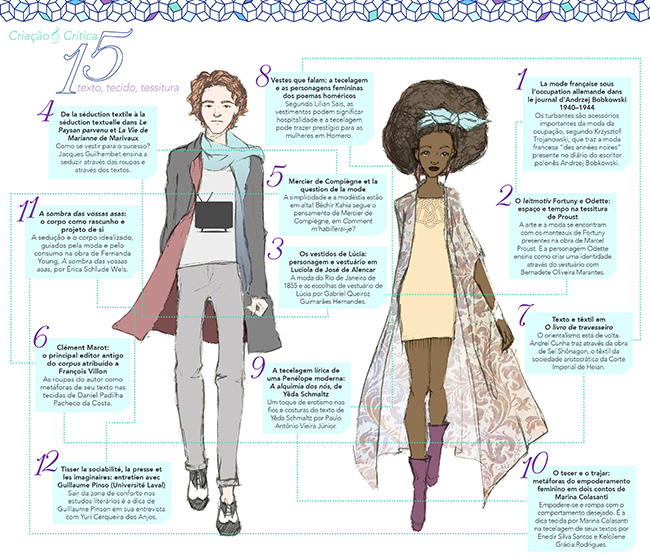The lyric weaving of a modern Penelope: alchemy of the nodes in Yeda Schmaltz
DOI:
https://doi.org/10.11606/issn.1984-1124.v0i15p136-159Keywords:
Yêda Schmaltz, ingrain, weaving, Penelope, eroticismAbstract
A alquimia dos nós (1979), of Yêda Schmaltz, reinvents the myth of Penelope in Homer's record, in the Odisseia. Through a female view, the constant lyrical voice in the book, especially in the first part, "Fios (O livro de Penélope)," develops the lyrical account of his union with Odysseus, the period suffering the absence of her husband and his return. The main change in the identity of Penelope from Schmaltz arises from reflection and treatment in relation to her sexuality and disenchantment to descry the beloved man when he returns. The verses that compose this work, often use the metaphor of weaving and fabric to characterize the lyrical voice as belonging to the heroine of the mythological past. But the metaphoric weaving also alludes to Penelope´s lonely sexuality and to the activity exercised by her, work with ingrain and poetic writing. This study undertakes reading the verses of Schmaltz from the considerations set on the metaphor of weaving and literary erotic consciousness developed by Hughes Liborel (1997), Ana Maria Machado (2001), Octavio Paz (2001) and Angélica Soares (1999).
Downloads
References
A BÍBLIA DE JERUSALÉM. 10.ed. São Paulo: Paulos, 2001.
BATAILLE, Georges. O erotismo. 3.ed. Trad. João Bénard da Costa. Lisboa: Edições Antígona, 1988.
COLASANTI, Marina. Doze reis e a moça no labirinto do vento. 8. ed. São Paulo: Global, 1999.
HOMERO. Odisseia. Trad. Antônio Pinto de Carvalho. São Paulo: Nova Cultural, 2003.
LIBOREL, Hughes. As fiandeiras. In.: BRUNEL, Pierre (org.). Dicionário de mitos literários. Trad. Carlos Sussekind...[et al]. Rio de Janeiro: José Olympio, 1997, p. 370-384.
LOPES, Cloves Trindade. Os nós de ‘A alquimia dos nós’. Dissertação (Mestrado em Letras). Universidade Federal de Goiás, Goiânia, 1989.
MACHADO, Ana Maria. Texturas: sobre leituras e escritos. Rio de Janeiro: Nova Fronteira, 2001.
PAZ, Octavio. A dupla chama: amor e erotismo. 4.ed. Trad. Wladir Dupont. São Paulo: Siciliano, 2001.
PLATÃO. O banquete. Trad. Donaldo Schuler. Porto Ale: gre: L&PM, 2011.
SOARES, Angélica. A paixão emancipatória: vozes femininas da liberação do erotismo na poesia brasileira. Rio de Janeiro: Difel, 1999.
SCHEID, John; SVENBRO, Jesper. O ofício de Zeus: Mito da tecelagem e do tecido no mundo grego-romano. Trad. Mario Fleig e Jasson Martins da Silva. Porto Alegre: CMC, 2010.
SCHMALTZ, Yêda. A alquimia dos nós. Goiânia: Secretaria de Educação e Cultura, 1979.
_____. Baco e Anas brasileiras. Rio de Janeiro: Achiamé, 1985.
_____. Atalanta. Rio de Janeiro: José Olympio; Brasília, DF: INL, 1987.
STENDHAL. Do amor. Trad. Herculano Villa-Boas. Porto Alegre: L&PM, 2007.
TELES, José Mendonça. Poesias e contos bacharéis II. Goiânia: Oriente, 1976.
TIETZMANN SILVA, Vera M. Penélope questionada – o tema do fio em Yêda Schmaltz. Signótica. Goiânia, ano II, janeiro/dezembro, 1990, p. 175-189.
Downloads
Published
Issue
Section
License
Authors who publish with this journal agree to the following terms:
- Authors retain copyright and grant the journal right of first publication with the work simultaneously licensed under a Creative Commons Attribution License that allows others to share the work with an acknowledgment of the work's authorship and initial publication in this journal.
- Authors can enter into separate, additional contractual arrangements for the non-exclusive distribution of the journal's published version of the work (e.g., post it to an institutional repository or publish it in a book), with an acknowledgment of its initial publication in this journal.
- Authors are permitted and encouraged to post their work online (e.g., in institutional repositories or on their website) before and during the submission process, as it can lead to productive exchanges, as well as earlier and greater citation of published work (See The Effect of Open Access).



